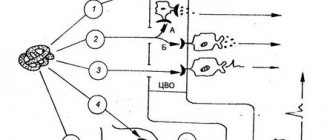What is cynicism
Cynicism is a human behavior that manifests itself in a negative, dismissive and even contemptuous attitude towards generally accepted moral, ethical, religious and cultural norms and values of other people. A cynic tends to judge a person based on his life experience, so such things as compassion, empathy, pity and shame seem fictitious to him. He does not see any use in them for selfish purposes.
In simple terms, cynicism is a view of life that denies the feelings and motivations caused by love, selflessness and sacrifice. People who hold such views consider it a fictional and socially approved reason to achieve their goals and gain benefits.
Cynics believe that all people are materialistic and want self-affirmation, so they subject all the emotions and feelings of others to analysis from a practical point of view. If it is not possible to draw a critical conclusion, then the person simply ridicules views and values that he does not understand.
General information and classification
The word cynic comes from “cynicus”, which means “cynic” in Latin. It is not surprising that the word cynic is considered as a synonym for cynic. This also includes a shameless person, a disgrace, an insolent person. There was a direction in philosophy that was represented by cynics - people who wanted to get rid of conventions and distance themselves from family, society, and the state. Illiteracy and bad behavior were seen as a good thing.
Cynicism is a deliberate disregard for ethics and moral values. It expresses inner rebellion. Cynicism can arise when a person feels impunity, he has nothing more to lose.
A cynic is a person who opposes the moral norms accepted in society. It is often associated with irony, tactlessness, a sense of permissiveness and rude behavior. Looking at a cynical person, one gets the impression that such concepts as kindness, sympathy, pity and modesty are unusual for him. But it is worth considering the fact that some individuals hide their hypersensitivity under cynicism, because they consider it their weak side.
If cynicism is moderate, then it is considered as a manifestation of intelligence. One may get the impression that a cynic is confident in himself and will never allow himself to be deceived. Cynical men are of interest to girls because they know how to joke ironically, such individuals are interesting interlocutors. But with prolonged communication, it becomes clear that the young man devalues those things that are significant to others, that he is not capable of deep feelings. Love and normal communication with a cynic is possible for a person who has a cynical character. But it’s better for vulnerable people not to start a relationship with a cynical person. Unless cynicism is a mask that allows you to hide your sensitivity.
Cynicism may manifest itself differently in different people. These types are distinguished.
- Healthy cynic. Such a person will not participate in the lottery and will be indifferent to letters of an obviously fraudulent nature. From one point of view, these are good traits, such a person is reasonable, but from the other, an indifferent attitude.
- A malicious pest. Any cynic who does not have the opportunity to stop in time will definitely fall into a similar state. He will be indifferent to the failure of others and will ignore losers. These cynics are absolutely miserable people.
- Anti lyricist. Such a person hates kisses when meeting, giving flowers, valentines. But this does not mean that he is completely devoid of feelings; in fact, this individual believes that such actions are not a manifestation of true romance. Such a person is a maximalist, he hates deception and often goes to extremes. The cynicism of a given person is a way of resisting obsessive opinions and banality. There is a risk that the anti-lyricist will begin to withdraw into himself or begin to commit evil towards other people. When you want a lot, but you get little, you become angry at people.
- Black comedian. Despite the fact that this type is the most harmless, it can greatly offend a sensitive person. Despite the “dark” jokes, such a cynic has a sense of compassion. They see black humor as just jokes. He can separate reality and the fantasy world. The negative aspects of this type are that people may perceive such a person as evil. An individual must feel the boundaries of what is permitted, and not be annoying, imposing his jokes on other people. If dark humor is not appreciated in a certain circle, there is no need to continue making such jokes or get upset that people do not understand such jokes.
- Materialist without imagination. Such a cynic has a strong mind that crowds out his feelings. At times this works to his advantage. This individual will not suffer from unrequited love. If he realizes that someone does not like him, he will simply switch his attention to other people. If any problem arises, he will not suffer, he will simply change the situation. In fact, such a person is deprived of many things in life. For example, while at a movie theater, a person will not evaluate the picture in general; he will observe how well the actors play. Such individuals do not believe in selflessness; they are incapable of empathy. There is a risk that life will remain exclusively business relationships.
To read: How to make peace with your girlfriend if you had a big fight
There is also another type of classification.
- Legal. Cynicism is aimed at laws, legal norms, and the unwillingness to live in accordance with them.
- Public. This cynicism is observed among a group of people who want to have a happy society, from individuals who are comfortable coexisting. At the same time, the moral norms that are characteristic of a given society are not taken into account.
- Social cynicism. It appears in the middle of a single community of people.
- Economic. Characterized by dissatisfaction with the economic system existing in the country, the functioning of economic laws at the time of development of society.
Signs of cynicism
It is best to understand what cynicism is, its signs will help. Let's look at its most common manifestations.
Specific behavior
A cynic speaks rudely, talks categorically about things and actions, dividing the world into “black and white,” does not take into account other people’s opinions and is dismissive of others.
Disregard for spiritual, moral and ethical values
He does not feel aesthetic pleasure from culture and adherence to morality, does not understand what others find in this, he respects only what can bring real, measurable benefit.
Absence of many experiences and reactions characteristic of most people
A cynic does not feel sympathy for others, does not regret the mistakes he has made, is not tormented by remorse and, in general, does not understand why burden himself with unnecessary negativity and scroll through unpleasant thoughts in his head many times.
Commercialism towards people
People with cynical views on life do not spend a lot of time on friends, they do not experience sincere joy from being close to someone, creating their environment, they usually think in advance what benefits and benefits they can get from meeting someone.
Skepticism towards things that are important to others
A cynic speaks with sarcasm or ridicule about what is important to loved ones: desires, dreams, faith, plans and attempts to change something. At the same time, he himself does not understand how much this hurts those around him. Therefore, it is often very difficult for a cynic to find friends.
Lack of authority
People who admire outstanding personalities, their achievements and actions, cause bewilderment in a cynical person. He doesn’t understand how you can be so interested in and respect someone. Moreover, the very success of this person evokes an emotional response from the cynic.
Special compassion and empathy
Despite his callousness and detachment from other people, a cynic can still express some compassion and empathy. True, he does this not out of good and sincere motives, but more for self-affirmation - this way he can show others and himself how highly developed a person he is.
Reasons for cynical behavior
According to some psychologists, one of the reasons for cynical behavior is the negative influence of social institutions. Problems arise when a cynical girl or guy, without sufficient knowledge and life experience, tries to build their own system of moral values. In this case, the behavior of adolescents is of a pronounced asocial, often antisocial nature.
Initial signs are presented in the form of negativism - refusal to carry out the instructions and instructions of adults, including parents and teachers. Subsequently, negativism transforms into cynicism if there are prerequisites for such a transformation, for example, an unfavorable psychological microclimate in the family or at school, misunderstanding, or indifference on the part of adults.
Cynicism develops as a teenager’s defensive reaction to negative external influences - cruelty from others, the influence of tragic, traumatic events. People become cynical because their parents used incorrect methods of education, resorted to such methods as harsh treatment, humiliation, insult, moralizing, which is why children develop a reaction of disobedience, rejection of values approved by adults.
Other reasons: excessive attention and care from parents, the influence of the media, examples of behavior from friends, authoritative members of the company, the desire to confront the whole world. American writer G. Kemelman, author of a series of detective novels about Rabbi D. Small, who manages to solve complicated crimes faster than professional detectives, called cynicism disillusioned idealism.
Many psychologists are inclined to believe that behind the mask of cynicism there is often hidden increased sensitivity, emotionality, and receptivity. Such people are vulnerable to negative external influences - ridicule, humiliation, psychological pressure, which forces them to resort to irony and sarcasm as a means of defense against attacks.
The objectivity of such mechanisms for the formation of a cynical worldview is confirmed by the results of a study that was conducted among a group of job seekers. The behavior of 85% of applicants was deliberately cynical - they behaved impudently, coolly, dispassionately, and emotionally restrained.
Psychologists noted that the reason for this behavior lies in the fear of failing at an interview. By resorting to cynicism, applicants for a vacant position sought to hide their disappointment and worries about a possible refusal, they did not want to show others their weakness and their true emotions - bitterness, resentment, hurt pride.
Reasons for cynicism
From a psychological point of view, healthy cynicism is a protective mechanism of the psyche against excessive and severe stress. People whose professions are associated with frequent emotional burnout one way or another become cynics in the professional sphere.
This type of cynicism even has its own name: “cold cynicism,” which means the recognition of habitual ethical standards as unnecessary. This helps people do their work efficiently and with a cool head, and not be distracted by various emotions: pity, compassion, disgust, fear, etc.
But cynicism may have other, less productive reasons for its occurrence. For example, great shocks, from which the psyche is protected by the mechanism of denial. They turn into the denial of all other values.
Reasons for cynicism include:
- deep disappointment in a loved one due to loss, betrayal, etc.;
- appropriate parenting model (rude or unemotional parents);
- conflict within the individual, loss of ideals and faith in justice, destruction of illusions and hopes;
- uncertainty about the future, feeling of insecurity, lack of support;
- high self-esteem, pride and selfishness, condescension towards others;
- rejection of generally accepted values in pursuit of individuality and originality.
Who is a cynical person or a cynic person?
Cynicism is a pronounced personality trait. Only an adult with formed life principles, experience and a conscious choice of such a position can be called a true cynic. Such a person is accustomed to believing that people can be replaced, and there are no things that really need to be treasured. A cynic makes contact with others only if he sees this as a benefit for himself or does not violate his comfort. He is indifferent to everything sublime and love for him is limited only to the physical aspect. Such a person is alien to sympathy, sympathy, and compassion in difficult life situations.
A person characterized by cynicism devalues the achievements and pleasant events of those around him. He has no authority, and is often intolerant of his opponent’s position, considering his opinion the only correct one.
Cynicism has long been no longer perceived in such a negative light as in Ancient Greece, and is even becoming fashionable. More and more young people consider this position to be strong and reasonable.
There are different types of cynics, and they can be roughly divided into the following types:
- Healthy cynicism
. This type cannot be called a disadvantage. With healthy cynicism, a person does not get carried away by lotteries, does not follow the lead of impudent people, and does not allow himself to be insulted or deceived. - Romance hater
. He is offended and irritated by expressions of love, kisses, flowers and sweet love letters and other romance. He is sure that if love exists, it is expressed differently. He often goes to extremes and cannot stand deception and platitudes. - Supporter of black humor
. A cynic who often shocks others with rude jokes “on the verge of a foul.” A fairly innocent type of cynicism, but many find it particularly offensive. Despite a cynical sense of humor, such a person is often distinguished by a good disposition and, paradoxically, loves those around him. - Pest
. A cynic who has no control over his disdainful attitude towards others can quickly fall into this state. He is not only indifferent to the grief of others, but can also openly gloat over them. He likes to mock others, and even the fact that some of them are not able to stand up for themselves does not stop him. - Materialist
. Cynicism, in which feelings are “turned off” - only reason and clear calculation are present. Such a cynic will not be tormented by an ending romance or someone’s unkind attitude. Realizing that the relationship is not working out, he easily gets rid of it.
Types of cynicism
All manifestations of cynicism can be divided into 2 types: everyday and professional cynicism.
Everyday cynicism
This type of cynicism includes everything that a cynic does in everyday life. Unflattering statements about others, caustic remarks and ridicule of loved ones, disregard for generally accepted rules, eccentric actions and disregard for the interests of society.
This also includes cynical statements and attitudes towards the opposite sex, which are widespread among both male and female cynics.
Professional cynicism
This type of cynicism affects people whose work involves serious psychological stress. In this way they protect their psyche from stress. This means that cynicism in this manifestation is useful, but in everyday life people may not be cynical at all.
Professional cynicism can occur among doctors, law enforcement officials, firefighters and rescue workers, as well as various employees whose duties include communicating with clients, incl. and dissatisfied.
Cynicism Cynic Cynical
Cynicism as a personality quality is a tendency to display
a frank, defiantly dismissive and contemptuous, to the point of arrogance and shamelessness, attitude towards the norms of public morality, cultural values and ideas of decency
.
An undertaker, a member of the Undertakers' Trust, saw a man leaning on a shovel and asked why he was not working. “And because,” answered the man with the shovel, “I am a member of the National Extortion Society of Gravediggers, and we adopted a resolution to reduce the production of graves in order to raise the tariffs for each one.” We are a monopoly in this business and intend to benefit as much as possible from our advantage. “My friend,” said a member of the Undertaker Trust. - Your plans are harmful and dangerous. If people do not have guarantees for the purchase of graves, I am afraid they will simply stop dying, and the highest interests of civilization will suffer like foliage from frost.
Cynicism is an acquired personality quality that serves as a defensive reaction to external stimuli. People are not born cynics; life makes people cynics. Ultimately, cynicism is disillusioned romanticism. When a person is disappointed in someone or something and does not understand the reasons for his disappointment, he takes a step towards cynicism. At this moment, I would like to add more mental strength to him, but, unfortunately, life is not a fairy tale, and there is not always a good fairy who can support him at such a moment in life. A person who is disillusioned with the phenomena of the material world, but firmly understands and believes in the power of spiritual values, will not take the path of cynicism.
It seems illogical, but adherents of cynicism become people with a fine mental organization, vulnerable, who deeply and fully accepted life and had bright hopes for it. A “venerable” cynic will say: “Nonsense. Romance and vulnerability are not “my closet.” However, the dynamics of personality formation confirms: trampled dreams and lost illusions, reinforced by the lack of solid life principles and an understanding of the true taste of happiness, lead a person to malicious cynicism. Romain Gary noted: “Cynics are, as a rule, very vulnerable people who are ready to kill their own father just to overcome their vulnerability.” Suffering, experiencing pain in feelings and mind, going through a personal crisis, experiencing what was lost for the hundredth time, a rejected romantic loses his life foundation, does not feel the “ground under his feet,” becoming an easy prey for cynicism. The meanness and hypocrisy of life have broken these sensitive personalities, so cynicism in the form of sarcasm becomes their mask, a “body armor” with which they protect themselves from the cruelty of the world around them. It is not their fault, but their misfortune that they were not prepared, strong and persistent enough to withstand the harsh realities of life. Life's cataclysms can result not only in the form of cynicism, but also complete despair. It seems that we need to give preference to cynicism over the powerless, crushed, and not inclined to resist despair.
Disappointment, having become the mother of cynicism, forces him to call a spade a spade with extreme honesty. A person who blurts out the truth at the wrong moment at the wrong time is labeled a “cynic.” This truth outrages, offends and bewilders those around you. Since a cynic cannot be called a “truth teller,” he uses “black” humor to make his harsh statements. H.G. Wells also said: “Cynicism is humor in a bad mood.” Cynicism, as a reflection of a well-developed intellect, is capable of giving birth to real masterpieces of humor. It is no coincidence that witty cynics are at a high price in the humorous genre of the stage. A person who loves jokes in the style of: “Nothing raises a person above the crowd like the gallows,” “To solve two global problems in the world, you need to feed the homeless to the hungry,” demonstrates a harmless form of cynicism. She is only offended by stupidity. Let's listen to the Odessa dialogue: “Hello! Are you not dead yet? Answer: “If you can’t wait, I’ll dance on your graves.” A lively conversation takes place in banter with each other and it does not occur to anyone to be offended. It seems that a conversation in the style of “How are you?” is more cynical due to its indifference. - "Fine". In this so-called conversation there are more attributes of real cynicism - insensitivity and indifference to others.
Cynicism, as a spitting on moral values, would seem to be the destroyer of everything that is purest and brightest in people’s lives. This is a simplified vision and understanding of the issue. The cynic devalues, denies and renounces many human values not for the sake of showing off and showing off. Ostentatious cynicism often occurs when the human psyche needs to somehow protect itself from the horror and fear of the present moment. Cynicism has many masks, sometimes it disguises itself as wisdom. Stephen Colbert writes: “Don’t be afraid to be stupid. It is impossible to be young and wise. Young people who claim wisdom are usually cynics. Cynicism masquerades as wisdom, but in reality it is very far from it. Because cynics don't learn anything new. Cynicism is a voluntary blindness, a refusal of the world, because the cynic is afraid that the world is dangerous and may disappoint him. A cynic always says no.
Cynicism is not tasked with subverting moral principles; through its manifestation, it tries to show its selfhood, otherness, originality and unique individuality. To get out of the general system of conformists, to distance himself from the stupid crowd, to find himself - this is his true task. In addition, contemptuous cynicism is a form of protest against imposed patterns of behavior and stereotypes.
A cynic, at times, is sure that give him the “captain’s helm” and he will easily guide the ship of the world, state or company to the cherished harbor through storms, fogs and underwater reefs. But as soon as fortune decides that power falls into the hands of a cynic, the bubble of his adventures and projects bursts in the shortest possible time. Therefore, cynics are intuitively afraid of responsibility and try to stay in the shadows. They love honor, approval and recognition, but expect it to fall on them naturally, like manna from heaven.
Cynicism is most openly manifested in the principle: “Everything in this world is bought and sold.” With a fair amount of skepticism and mockery, the cynic listens to objections: “Love and friendship cannot be bought with money.” A cynic with big money is a cynic squared. He sees what power the “despicable metal” has over people. He believes that money gives freedom, opening any doors and providing countless opportunities to realize one’s desires. Seeing people “drooling” at the sight of money, the cynic becomes even more strengthened in his beliefs. But one thing torments the soul, all possible desires are satisfied, but there is no happiness. And he doesn’t know where to go next. Inside there is emptiness, anxiety and anxiety.
Writer Liliya Kim describes the story of such a very, very wealthy cynic in one of the stories in her book “Obsession (Bible Revised and Amplified).” The ending of the story seems like this. “No one is around. The young, naive slut left, tomorrow another one will appear, and so on until the very end, until Joseph ends up alone in a huge bed, in a luxurious house, surrounded by the best things and the most expensive accessories. Then there will be a breathtakingly luxurious funeral, Joseph will be solemnly stuffed into a stone bag, walled up there so that the smell of the corpse does not seep out, all his property will be stolen and they will forget about the dead man, who will happily rot and decay in his crypt, as Jacob had already done. And the strange thing is that Joseph could have achieved this ending with equal success, being a dirty, unemployed homeless person in this city. Jacob smiled at his son from the photo and shook his finger. Joseph sighed heavily, despair seized him at the thought that such mortal melancholy would last for at least another fifteen years.”
Petr Kovalev 2013 Other articles by the author: https://www.podskazki.info/karta-statej/
How to Deal with a Cynic
Dealing with a cynic is not an easy task. It is especially difficult for people who are sensitive to manifestations of cynicism: jokes “below the belt” and a disdainful attitude towards themselves. In this case, it is better to reduce communication with cynical acquaintances and colleagues to a minimum.
But sometimes you have to interact against your will; in this case, there are some useful tips:
- Don't convince the cynic. Such people often have inflated self-esteem, so they consider themselves very smart and right in everything.
- Don't argue with them. A cynic loves to engage in demagoguery, so he will turn any argument in his direction, even if his arguments no longer relate to the topic. Make sure the conversation is specific and concise.
- Avoid conflict. Don't let a cynic drag you into controversial situations. You will not achieve justice, and your opponent will once again be convinced of his superiority.
- Enter his zone of trust. This advice will be effective if the cynic is a close and important person to you. Try to talk in such a way that the cynic speaks out and explains why he treats others and life in general this way. If you can figure this out, then further communication can become better and friendlier.
- Don't try to correct a cynic. Even if a person has opened his soul to you, this does not mean that he is ready to listen and accept other people’s advice. Forcibly “doing good” will only worsen the relationship between you.
Cynic in love
As the definition says, a cynic is a person who rejects standard ideas about love and family. This life position is reflected in relationships with the opposite sex. He knows the laws of seduction, but uses his charm only when he is carried away. Feelings such as empathy and friendliness are alien to him, so acquaintance will only take place if this is part of his plans.
Research by modern psychologists shows that women subconsciously choose men who are prone to cynicism. Historical and literary sources show many examples of women choosing men who treated them with disdain and openly rejected them. Evgeny and Tatiana (“Eugene Onegin” by A. Pushkin), Pechorin and Princess Mary (“Hero of Our Time” by M. Lermontov), Bazarov and Fenechka or Odintsova (“Fathers and Sons” by I. Turgenev).
Men who are characterized by traits of Machiavellianism and narcissism will easily, without making any effort, win the lady of their heart. Machiavellianism is behavior based on disregard for moral standards and the manifestation of brute force in achieving goals. Narcissism presupposes narcissism, selfishness, and the absence of other life guidelines except for one’s own benefit. Such a man knows his strengths and is confident in his own attractiveness.
Burnt with life, rough, brutal macho is the standard of male beauty for many representatives of the fair sex. Psychologists explain such preferences by a subconscious desire to choose a male leader who has excellent physical characteristics, an extraordinary mind, willpower, and knows how to survive and run. This set of qualities at the subconscious level is associated with high chances during natural selection, which forces a woman focused on creating a family to seek an alliance with an invincible leader.
Women's cynicism always looks more vulgar and vulgar. Excessive coldness, indifference, and callousness often go hand in hand with loneliness. A cynical woman attracts weak, insecure men who recognize her right to leadership and trust her to manage finances and relationships.
Such a lady may be interested in an accomplished and strong-willed man who, due to his hunting instinct, intends to conquer a peak that is beyond the reach of anyone. The recognized heartthrob sees in her broad prospects for self-affirmation. To be fair, it is worth noting that the character qualities inherent in cynical women, such as courage, determination, the ability to present oneself and achieve goals, appeal to the majority of males.
Advantages and disadvantages of cynicism
It would seem that cynicism is a rather negative model of behavior that interferes not only with others, but also with its owner. Nevertheless, this phenomenon also has positive features. Let's look at both sides and the meaning of cynicism in more detail.
Advantages
- Cynicism gives a person determination and courage.
- Helps to take a rational approach to decisions and actions.
- Makes people honest and open, because... cynicism is the opposite of hypocrisy.
- Do not allow yourself to be entertained by false hopes or experiences - both negative and positive.
- Relieves unnecessary stress during mental stress and difficult situations.
- Allows you not to worry and not depend on other people's opinions.
Flaws
- The character traits of a cynic interfere with communication and establishing contacts with others.
- A limited circle of friends due to the person’s tactlessness.
- The cynic himself does not notice and does not understand how he offends people.
- People around them try to avoid cynical people so as not to have to deal with them.
- It is difficult for a cynic to feel and enjoy positive emotions, to be happy and to share simple human values.
- Sometimes a cynic’s behavior only evokes pity, and this greatly hurts his ego.
Who is this cynic?
A cynic is a person who demonstratively disregards social, cultural or religious values, as well as moral norms and rules of behavior. There is no consensus in society regarding this type of people. Some see in the cynic a strong personality, witty and decisive, who sees human shortcomings and boldly condemns them. Others believe that a cynical person is an immoral type who is not capable of feeling, but only mocks everything that is dear to normal people. Let's try to figure out which of them is closer to the truth.
Describing the cynic personality type, the authors place the main emphasis on the destructiveness of this concept. So, most readers who want to understand this topic, without extensive searching on the Internet, will read a couple of articles and decide that cynics are bad. But, if you analyze your own life experience , it becomes clear that a cynical person is not such a bad person at all. First, let's look at the concept itself and the history of its origin.
Rebellion against social norms and routines has probably occurred since the beginning of humanity. This was not yet cynicism, in its modern sense. It’s just that some people, due to the characteristics of their temperament or character, find it more difficult to get along with others. For the first time, cynicism as a mass phenomenon appeared in Ancient Greece, around the 4th-5th centuries BC. It was then that the thinker Antisthenes founded the philosophical school of the Cynics, who began to fight against conventions. They welcomed maximum simplification and naturalness in all areas of life. The Romans apparently did not pronounce the letter “k” well, so they later renamed them Cynics.
Take a temperament test
One of the brightest followers of Cynicism was Diogenes of Sinope, who was remembered by his contemporaries and descendants for his unique way of life. The idea of him as a philosopher who lived in a barrel has firmly entered into popular culture. Even as a philosophy, cynicism was closely related to marginality, that is, the loss of a person from social relationships. Even in the 21st century, this type of thinking pushes its owner towards an asocial lifestyle. But this happens only in the case of pronounced cynicism.
Centuries passed, and gradually philosophical cynicism retreated, leaving only a word that began to be used to call those who do not accept social norms. It is unlikely that modern homeless people or spiteful critics who denigrate any aspects of human relations feel involved in philosophy. But are people who show cynicism so wrong? To answer this question, it is necessary to understand the reasons that give rise to this type of worldview.
As a rule, people become cynics in response to impunity or disappointment. These are different options, and therefore their “fruits” cannot be assessed in the same way. In the first case, we are talking about a feeling of permissiveness and self-confidence, when egocentrism dominates. Representatives of the “golden youth” are considered a striking example of such cynics. They do not believe in the sincerity of those around them, they revel in the power of their parents’ money, they do not care about laws and orders, realizing that they will be able to pay themselves off in any situation. Sometimes their behavior poses a threat to others.
The second option includes cynics who are simply disillusioned with the justice of the world. This worldview becomes a defensive reaction for them. Unlike majors, such people are characterized by a certain mental disorder, which can progress, turning them into criminals or misanthropes (they hate others). Depending on the degree of severity of cynicism, it is customary to talk about its various types, which we will consider in detail.
Examples of cynicism
In simple words, cynicism is a demonstrative manifestation of one’s negative attitude towards other people, their views and values.
In literature, heroes with this character trait are often vividly described. Let's look at a few examples of cynicism.
From an early age, everyone knows a true cynic - Carlson. Throughout the story, he is cynical and selfish towards the Kid, who, in turn, sincerely became attached to the hero in the prime of his life.
Another bright literary cynic hero is Evgeny Bazarov, a real nihilist from I. S. Turgenev’s novel “Fathers and Sons.” Because of his loneliness and sense of loss, he was a cynic in his feelings and thoughts, as well as in his statements and manners. From the outside, he seemed like a rather interesting person, but his cynicism, pride, arrogance and disdain for the people around him sometimes turned into outright stupidity.
Almost the same can be said about another famous hero of literature and cinema - Ostap Bender. His excessive cynicism served to obtain outright personal gain. He often played into Ostap's hands: he endowed him with insight, intuition, intelligence and composure. But if he had been able to awaken at least some vital values in himself and used them also skillfully, coupled with cynicism, he would have secured an excellent career for himself, and not petty scams and frauds.
Types of cynical personality
A cynical person is the kind of person who often becomes under the influence of external circumstances. He degrades the institution of marriage and family, mocks the rules that members of society adhere to, which is symbolic - after all, it is society that is usually the cause of such deformation of the individual. There are types:
- A reluctant cynic. Becomes cynical under the influence of family. Family is the first source of knowledge and behavioral skills. The family passes on all its accumulated experience to the child. This type develops as a result of the absence of a family (orphans and children from single-parent families) or a consequence of an unfavorable family environment (the use of violent methods of education, constant criticism of the child’s personality and behavior, rejection of his personality and needs, or, on the contrary, indulgence in whims, indulgence of any whims).
- Cynic goalkeeper. Acquires the traits of a cynical person under the influence of school. In an educational institution, a child acquires knowledge accumulated by society, becomes familiar with generally accepted social norms, and is instilled with spiritual values. Within the walls of school, the child spends most of his time with peers, and he often has to deal with aggression and betrayal. The negative attitude of others, the need to confront the overwhelming majority - these are the prerequisites that provoke the launch, activation of a defense mechanism, manifested in the form of cynical behavior.
- False cynic. Behaves cynically under the influence of friends and the media. The formation of character and personality traits occurs under the influence of the authority of friends who are role models. The child copies the behavior of peers who, in his opinion, have a high social status and are respected. Negative examples of cynical behavior can be borrowed from social networks and other Internet resources.
To summarize, to become a cynic, you need to be born into a dysfunctional family, fall under the influence of bad company, or be a person exposed to external influences, as happens when screen heroes become role models. Another classification involves division into types:
- A follower of black humor. An example is the main character of the television series "House".
- Anti-romantic. A typical example is Ostap Bender.
- Materialist. A striking example is Sherlock Holmes.
- The villain. An example is the Joker from the television series Suicide Squad.
In this classification, a healthy cynic is represented by the image of Monica from the popular television series “Friends”, which means the ability not to respond to calls from the category of making a donation or giving money to charity; her words on this matter show more rationalism and practicality than indifference.
Monica understands that her sorrows and worries will not help the tramp find a home, or the cripple regain his health. She uses her own material and mental resources to improve the lives of close friends, not strangers.











